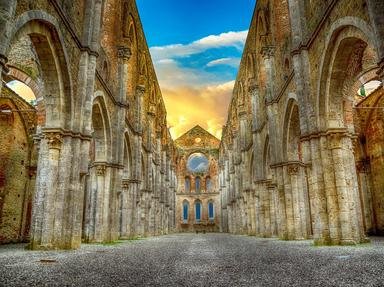Quiz Answer Key and Fun Facts
1. Teodulo Mabellini relates in his 1844 opera a dramatic episode during the Fourth Crusade. Because of what we would now call "a trade dispute", the Crusaders didn't march against the Moslems but against their fellow Christians at Constantinople. Which people were behind this diversion of the Fourth Crusade?
2. In 1878, Jules Deswert completed an opera about a group of people living near a city in Southern France. Pope Innocent III (1160-1219) summoned in 1209 a Crusade against these people. Who were these people, who called themselves "Catharists" ("The Pure")?
3. In 1983, Olivier Messiaen composed an opera about a very important Saint. This Saint lived in Italy from 1181 till 1226. He founded the Order of the Friars Minor and is best known as Patron Saint of animals. His feast is celebrated on October 4th. Who is this Saint? Please use the ENGLISH orthography.
4. 1777 saw the first night of Pasquale Anfossi's opera "Gengis Khan" ("Genghis Khan"). According to some historical sources, what was probably the cause of Genghis' death?
5. Many Saints that lived in the Middle Ages were of noble birth. And yet there are only a few Kings that are canonized. One of these canonized Kings was the leader of the Seventh and Eighth Crusades. This King of France died near Tunis in 1270. He was canonised in 1297 and his feast is celebrated on August 25th. He is (among others) patron saint of the deaf. The Belgian brewer Van Honsebrouck named a beer after him, and Darius Milhaud dedicated his 1972 opera to him. Who is this Saint? Please answer in the FRENCH orthography.
6. Giuseppe Verdi named an opera he composed in 1855 after a Sicilian uprising that took place in 1282. History gave this Sicilian uprising the name of a certain prayer. Which prayer was the starting signal of this Sicilian rebellion?
7. Sergei Rachmaninoff completed in 1906 an opera named after the wife of Giovanni Malatesta. As Giovanni was lame and deformed, his wife committed adultery with his brother Paolo. When Giovanni caught them "in flagrante delicto", he killed them both. Who was this woman born an Italian noble?
8. 1892 saw the first night of Richard Hol's work for musical theatre "Floris V". Of which present day country was Floris V one of the noblemen in the thirteenth century?
9. In 1886, Henry Litolff composed an opera about a notorious monastic order that came into conflict with the French King Philip IV the Fair. Philip had the Grandmaster of this monastic order executed in 1314. What was the name of this monastic order?
10. Pavlos Carrer completed in 1852 an opera entitled "Dante e Beatrice" - about the famous poet and his beloved. Did Dante and Beatrice ever marry each other?
11. Louis Niedermeyer named an opera he composed in 1846 after Robert, the Scottish King from 1306 till 1329. The surname of this Robert may hint at the city where his ancestors lived. Which city would have given a surname to Robert?
12. In 1347, a French city was captured by the English during the Hundred Years' War. This fact inspired Samuel Arnold for an opera he composed in 1791, and Auguste Rodin for a sculpture that he made in 1884-1886. Which French city surrendered to the English in 1347?
13. In 1829, Gioachino Rossini completed his opera "Guillaume Tell". This national hero of Switzerland was said to have been a historical character according to some sources, but a fictional character according to other sources. However, fact is that Switzerland emerged as an independent country after the oath taken by three present-day cantons. Two of the three cantons which first claimed independence from the Habsburg Empire were Uri and Unterwalden. Which was the third?
14. One of Giuseppe Verdi's more obscure operas had its first night in 1857. This opera entitled "Simone Boccanegra" was named after the first Duke of an Italian city, who took command in 1339. This city was the birthplace of Christopher Columbus in 1451. Which Italian city was commanded by Duke Simone Boccanegra from 1339 on? You may answer in the English or Italian orthography.
15. Franz von Suppé composed in 1879 an operette by the name of "Boccaccio". This opera was named after the Italian poet Giovanni Boccaccio (1313-1375). What was the title of Boccaccio's masterpiece?
Source: Author
JanIQ
This quiz was reviewed by FunTrivia editor
bloomsby before going online.
Any errors found in FunTrivia content are routinely corrected through our feedback system.
